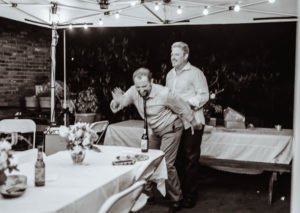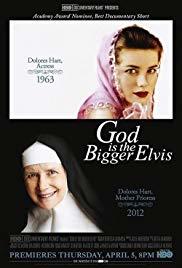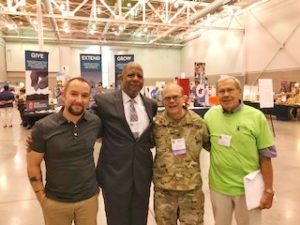Jason Micheli's Blog, page 119
July 10, 2018
Catching Holiness
 While I’m preaching through Ephesians at my new appointment, I noticed this Sunday’s lectionary was the story of David and Uzzah from 2 Samuel 6. It’s too odd and disturbing a passage to let slide. Here’s an old reflection on the text.
While I’m preaching through Ephesians at my new appointment, I noticed this Sunday’s lectionary was the story of David and Uzzah from 2 Samuel 6. It’s too odd and disturbing a passage to let slide. Here’s an old reflection on the text.
True story:
During my first year of seminary I served as an intern at a small Methodist church pastored by Rev Carol McCallum.
True story:
That church celebrated communion not with a loaf of bread and a single chalice but with trays, the ones with the tiny pieces of bread and miniature cups. Normally those little cups were filled in the sacristy by a volunteer the day before.
True story:
On one Sunday those trays were apparently jostled while being transported from the sacristy to the altar table, spilling the juice out their little cups and, overnight, sealing the lid to the tray; so that, when it came time for the Great Thanksgiving and Rev Carol lifted the lid o the tray, it instead stuck and for a few seconds that felt like a lifetime the communion tray hung suspended a few inches above the altar until it came crashing down, spilling the blood of Christ all over the table.
That’s when Almighty God smote Rev Carol, struck her dead, right there on the floor of the sanctuary.
The first time I ever preached this scripture text from 2 Samuel 6 I began with that anecdote. And the congregation just kind of stared at me, stone- faced.
It was my first summer as the pastor at Linvale United Methodist Church. I was about 23 years old. I was still a student in seminary and, when it came to life, I still had a lot more to learn.
It was a sticky hot morning in July- dew was still burning o the grass in the parking lot as people trickled into the sanctuary.
Because Irma, the organist, wanted to take a break that Sunday, the morning’s music was led by her husband Les, who was as deaf as anyone I’ve ever met and played the accordion. I can say with hindsight that that was not a good idea.
According to the lectionary, Methodism’s schedule of assigned passages, the scripture that Sunday was the same one given today: this story of the ark and David dancing, half-naked, and Uzzah struck dead. It was not a text I would have chosen and for nearly 8 years I’ve been waiting for a do-over.
I was new to my role then. I hadn’t found my preaching voice or style. And I didn’t trust my ability to target a sermon to where people were in their lives. So I stuck to what I did know, to what I did feel comfortable with. I just explained the text. I took it at face value.
My opening illustration about Rev Carol having fallen flat, I just dove in to the text.
And I explained to those gathered at Linvale Church that Sunday morning how David is delivering the ark to Jerusalem in a shrewd move designed to legitimate his claim to the throne.
I explained how the ark symbolized God’s protection of and presence with the people Israel, and with the ark in Jerusalem, the city of David, everything the ark symbolized David’s throne now would as well.
I even described the ark for them, how it was a gilded box of acacia wood cornered by winged angles, how the ark was a pedestal for the invisibly enthroned Yahweh and how the dance that David and his 3,000 men do is a victory dance- because with God seated on the ark in the city of their King no one could defeat them.
Now the people at Linvale Church- they listened politely, but I could tell…I could tell from Sheldon sitting in the front pew and from Bob seated halfway back and from Andy all the way in the back by the aisle…I could tell they didn’t care much about that, about the ark, about Kingdom history or about David’s political maneuvering.
I could tell. They wanted to know about Uzzah.
At that point in my ministry I wasn’t a very observant preacher, but that morning I could tell that ever since Pam had read the scripture aloud everyone was wondering: ‘Well, wasn’t Uzzah just trying to help?’
According to 1 Samuel 6, I told them, the ark was supposed to be carried on poles by Levites, Israel’s special caste of priests. But that’s not what happens here. Either everyone had forgotten or, in their rush to get the ark to Jerusalem, they didn’t care. So instead of on gilded poles, it’s put on a wagon. Instead of being carried by priests it’s pulled by oxen.
In other words, according to this interpretation, Uzzah dies because he didn’t follow the directions. His haste to catch the ark is actually his trying to avoid the consequences of his actions. In other words, he had it coming to him.
Or, you could say that, at this point in the story, the ark’s been neglected for 20 years. For 20 years it’s been forgotten in a backwater valley. For 20 years no one has mentioned it or wondered about it or gone searching for it. You might think it’s vanished altogether.
But when David needs it to lend creedence to his crown, when David needs the symbol of God’s protection and presence to legitimate his own power, he knows exactly where it is. So you could suggest that God’s anger had been kindled already (for being neglected and used) and when the ark begins to fall, well, Uzzah just gets in the way.
I watched the faces in the sun-soaked pews following along. Perhaps it’s an issue of purity, I said. Maybe Uzzah had not made himself ritually clean for the ceremony, for the procession to Jerusalem. He wasn’t ritually prepared to come before God’s presence much less touch it.
It’s not that Uzzah did anything wrong, that’s just the way God’s holiness is. It’s like Fire: you can’t come close to it, you can’t touch it, you can’t catch holiness.
You can even argue, I told them, because of the intricacies of the Hebrew text, that where your bibles read “the oxen shook it” a better translation would say “the oxen stumbled” or an even more precise translation could read “the oxen made manure” and when Uzzah reaches out to steady the ark…he slips in it. Too bad for Uzzah. He was just in the wrong place at the wrong time. It happens, I said.
Les, the accordion player, who was nearly deaf, was sitting on the piano bench with his head half-cocked not sure if I’d just said what he thought he’d heard.
The clock on the sanctuary wall and the restlessness in the pews signaled that it was time for the ‘application’ part of my sermon, the ‘what this means for us now’ part of the sermon.
And I looked up from my notes and I said:
You can parse this passage a hundred di erent ways. But the bottom line is that Uzzah’s death is meant to be a reminder of God’s holiness.
Uzzah’s death is meant to point out to us what it points out to King David- that this God is not One to trifled to be with or treated casually or taken for granted.
And from there I wound my sermon to a close with a litany of DON’Ts.
Don’t reach out to this God if you’re aren’t serious about it, if you don’t want an answer or won’t follow through.
Don’t live any way you want, just coming here once a week, taking God’s mercy for granted.
Don’t come to Christ’s Table if you’re not sincere about living according to his Kingdom.
Don’t.
Don’t confess your sins if you’re not going to live a redeemed life.
Don’t pray if you’re not going to heed the answer.
Don’t come here on Sunday if you’re not here to worship.
This God, I preached, this God is not One to be trifled with.
This God has the freedom to be angry. And his anger has the power to knock you down. Faith in this God is not for the phony or feeble-hearted, I preached. Faith in this God is like playing with Fire.
And if memory serves me right I even wagged my finger at them.
Looking back, I suppose it was a bit intense for what was only my second Sunday at that church. And it’s not that what I preached wasn’t necessarily true, it just wasn’t true.
You know?
What I mean is…I didn’t know any of those people yet.
That sermon was 15 years ago now and I’ve been waiting for a do-over ever since.
I’ve been wanting a do-over because, that sermon, I preached it before I’d ever had to hold someone’s hand while a doctor issued news that would be hard to swallow and even harder to bear.
I preached that sermon before I’d ever had to knock on the door of a house where someone in the family wouldn’t be coming home that night. Or ever again.
I preached it before I’d ever had someone confide to me, ashamedly, that the reason they’d stopped giving to the church was because they’d lost their job a few weeks back.
Before a wife had ever cried in my o ce and told me how the drinking she thought her husband had knocked had snuck back on all of them.
I preached that sermon before I learned when and when not to answer questions like: how can God allow…why did god let this happen…?
I preached it, that sermon, before I ever had children of my own.
So this time when I come back to 2 Samuel 6 things are di erent. I’m di erent. Eight years later when I read about the ark and God’s bursting forth anger and Uzzah things are di erent.
And what I wonder this time, the question I have is: what about Uzzah’s mother? What about Uzzah’s wife, if he had one?
Did he have a best friend or kids?
What do you say to them: It’s all part of God’s plan, there’s a reason for everything, God’s ways are not our ways, he’s in a better place, God must have needed him in heaven?
Earlier this week I decided to try something. I read this story about Uzzah to my 6 year old son, Alexander. Actually I had to paraphrase it and tell it myself because Uzzah doesn’t make it into many children’s bibles.
‘What did happen to him?” Alexander asked me when I’d finished telling the story. What happened? Well, he died.
‘Why did he died?’
Uh…he got too close to God, to God’s holiness.
‘Why did God make him die?
He’s in a better place.
For a few moments I thought that was it, that was enough.
But then Alexander gave me a toothy look of perplexity and he asked me:
‘Dad, does Jesus do that?‘
And isn’t that the question?
That’s why, when it comes to the ark and God’s bursting forth anger and Uzzah, I’ve been itching for a do-over.
Because those years ago I spent so much time on this text, on these 11 verses, that I left out our Story (with a capital S). It’s not that what I preached wasn’t true. It just wasn’t the Gospel.
Because you and I we believe that God’s power and presence and holiness are found not in a gilded box that could blow at any time, but in the ark of Mary’s womb.
We believe that God’s strength it isn’t like a burst of dynamite. It’s found in that, while being equal with God, he emptied himself, taking the form of a slave.
We don’t believe that God’s anger can be so easily kindled against us. We believe that while we were yet sinners Christ died for us.
We don’t believe that we’re so unworthy that we can’t come close to God. We believe that in Jesus Christ God has come close to us and counted us worthy and that nothing we do can separate us from that Love.
And as easily as the cliches can roll off our tongues, the fact is we don’t believe that God takes us from us for reasons all his own. We believe that God loved us so much that he gave…that he gives…that in fact in Christ he has joined our life so we might not su er this life alone.
That’s our Story. And you better learn it because you’re going to run into Uzzah’s mother or wife or friend or children…all the time.
All those years ago…that’s how I should have ended the sermon.
Follow @cmsvoteup

July 9, 2018
I Like Big Buts: Reflections on Paul’s Letter to the Romans
 The gang at Crackers and Grape Juice has just released an e-book and paperback!
The gang at Crackers and Grape Juice has just released an e-book and paperback!
We’re calling it I Like Big Buts: Reflections on Paul’s Letter to the Romans. All four of us, Johanna, Taylor, Teer, and myself, have contributed to it. Johann’s introduction, wherein she makes fun of me without mercy, is worth the price of admission.
And, for goodness sake, the price is only $3.49.
Podcasting isn’t as cheap or easy as you might guess so we’re putting this book out there for you as a way of offering back something of substance in exchange for your support. All the proceeds from you purchasing the book in either kindle or paperback form go to support the podcast so you don’t need to worry about lining Teer’s pockets with your coin.
So do us these favors, would you?
Buy the book. You can find it in Amazon here. Or go to www.crackersandgrapejuice.com/books and purchase it through that link.
Tell other people about the book. Share the link above on social media. It gives you something to post other than cat pictures or your Trump rage.
Leave a review of it in Amazon. It helps other people discover it.
Since we started this 2 years ago, the podcast has become enormously successful, reaching a large and wide audience, and we have you to thank for it. So keep paying it forward!
Here it is again….do it!
https://www.amazon.com/Like-Big-Buts-...
Follow @cmsvoteup

July 8, 2018
You Are What You Hope
Ephesians 1.15-23
Many of you have asked me questions about where we’re living so I thought I’d let you know that my family and I moved into the neighborhood on Tuesday.
I think we can all agree it was perfect weather for grinding manual labor, as hot and moist as the devil’s undercarriage.
About moving- let me tell, it’s exhausting…
….watching my wife haul and unpack all those boxes.
Since last Sunday’s sermon, many of you have asked me other questions too.
“You seem so dignified- was that really you dancing in the picture?”
“Are you always sarcastic?”
“Does it usually take you so long in your sermons to get to the point?”
“Has anyone ever told you that you’re a dead-ringer for Ryan Gosling?”
The best question I got from a few of you.
It’s a question that gets right to the heart of the Apostle Paul’s rhetoric here in the first chapter of his epistle to the Ephesians.
In so many words, the question you asked me was this one:
If God chose us from before the foundation of the world
If everything has already been done- everything for your redemption, everything for your justification, everything for your salvation- by Christ for you
Then why bother?
In other words:
If you’re already and always forgiven in Christ, then why bother with Christianity?
Doesn’t that strike you as superfluous as purchasing the service plan at Best Buy?
If you’ve no reason to fear fire and brimstone, then what reason do you have to follow?
Because you don’t you know- have any reason to fear.
Fear God or fear for your salvation.
As St. Paul says here in verse 20, Christ has sat down at the right hand of the Father.
As the Book of Hebrews puts it, Christ’s sitting down marks the cessation of God’s judgement, for Christ our Great High Priest has offered himself as a perfect, once-for-all sacrifice for your every sin.
Christ has sat down from his work.
Never to get up again.
And though we still like to the play the judgement game with each other, he’s taken a seat from it and put up his feet, with all our sins forgotten underneath his heels, like a father waiting for his prodigal child to come home.
You are forgiven.
You have no reason to fear.
Because, as Paul says here in verse 23, the pleroma, the fullness, the plentitude, the whole reality of God (without remainder), dwells in Christ Jesus who bore your sins in his body upon the tree.
Pleroma–
You’ve been incorporated in to Christ fully, Paul says, and so you are fully restored to God. You have fullness with God through Jesus Christ in whom God fully dwells.
Fully is Paul’s key boldfaced word here at the end of Ephesians 1.
Fully: there is no lack in your relationship with God.
At least-
From God’s side there’s not.
No other book of the New Testament stresses the completeness of what Christ has done like the Book of Ephesians.
There is no tension in Ephesians between the already and the not yet.
In Ephesians, it’s all already.
It’s all been done.
What he has done for you- it’s fact.
And it has nothing to do with how you feel about him.
Christ’s incorporation of you has happened- literally- over your dead body, your sin-dead body, when you were buried with him in your baptism.
From Paul’s perspective, “What must I do to be saved?” is the wrong question to ask this side of the cross because you were saved- already- in 33 AD and Christ’s cross never stops paying it forward into the future for you.
Because you are fully in him.
And in him, you are forever safe from the wages of your sin.
He has sat down from his work with all our sins beneath his feet- that’s a sign as obvious as an empty tomb.
A sign that God forever rejects our rejection of him.
God literally does not give a damn anymore.
But, that begs the question, your question:
If you’re already forgiven, once for always and all
If you’re a sinner in the hands of a loving God
If God’s grace is not transactional
If there’s no work you must do to merit it
Then, why bother following?
Why bother giving up your time on a Sunday morning?
Why bother forking over your hard-earned dough into the offering plate?
Why bother entangling your life with someone as crazy Peter or as challenging as Chenda?
————————
If we have no reason to fear God, if we are in him and all our sins sit forever underneath his feet, then what’s the incentive to follow Christ?
Why would you bother?
Why would you forgive that person in your life, who knows exactly what they do to you, as many as 70 x 7 times? Why would you do that if you know you’ve already been forgiven for not doing it?
Why bother arguing about welcoming the stranger and caring for the immigrant in your land?
Why all the heartache and anxiety about it if, when you don’t welcome or care for them, Christ is only going to say to you what he says to the woman caught in sin: I do not condemn you?
What’s the point?
What’s the benefit to you?
If you’ve no reason to fear Christ, if you’ve nothing to earn from him that isn’t already yours, then why bother following the hard and peculiar path laid out by Christ?
————————
We don’t have the cable hooked up at the new house yet; however, I have this HBO Now app on my iPhone.
So anywhere, anytime, whenever I want, on my 8 Plus screen I can watch Rape of Thrones. Or, if I’m in the mood for something less violent, I can watch old episodes of the Sopranos or Westworld right there on my phone.
Or, if I want to see more of Matthew McConaughey than I need to see I can rebinge season one of True Detective. Right there on my iPhone, I can thumb through all of HBO’s titles; it’s like a rolodex of violence and profanity, sex and secularism.
Earlier this week, while Ali was busy hauling and unpacking boxes, I opened the HBO Now app on my phone, and I wasn’t in the mood for another brother-sister funeral wake make-out session on Game of Thrones. Because I wasn’t in the mood for my usual purient interests, I rewatched this little documentary from 2011 about Delores Hart.
Delores Hart was an actress in the 1950’s and 60’s. Her father was a poor man’s Clark Gable and had starred in Forever Amber. She grew up a Hollywood brat until her parents split at which time she went to live with her grandpa, who was a movie theater projectionist in Chicago.
Delores would sit in the dark alcove of her grandpa’s movie house watching film after film and dreaming tinseltown dreams.
After high school and college, Delores Hart landed a role as Elvis Presley’s love interest in the 1956 film Loving You, a role that featured a provocative 15 second kiss with Elvis. She starred with Elvis again in 1958 in King Creole.
She followed that up with an award-winning turn on Broadway in the Pleasure of His Company. In 1960 she starred in the cult-hit, spring break flick Where the Boys Are, which led to the lead in the golden-globe winning film The Inspector in 1961.
Delores Hart was the toast of Hollywood. She was compared to Grace Kelley. She was pursued by Elvis Presley and Paul Newman. Her childhood dreams were coming true. She was engaged to a famous L.A. architect.
But then-
In 1963 she was in New York promoting her new movie Come Fly with Me when something compelled her- called her- to take a one-way cab ride to the Benedictine abbey, Regina Laudis, in Bethlehem, Connecticut for a retreat.
After the retreat, she returned to her red carpet Hollywood life and society pages engagement but she was overwhelmed by an ache, a sensation of absence.
Emptiness.
“I had it all, everything really, but my life wasn’t full,” she says in the documentary.
So, she quit her acting gigs.
She got rid of all her baubles.
And she broke off her engagement.
She renounced all of her former dreams- and joined that Benedictine convent where she is the head prioress today.
What’s more remarkable-
What’s more remarkable than her story is the documentary filmmakers’ reaction to it, their appropriation of it.
This is HBO remember, the flagship station for everything postmodern, postChristian, purient and radically secular.
Here’s this odd story of a woman giving up her red carpet dreams and giving her life to God, and the filmmakers aren’t just respectful of her story; they’re drawn to it.
They’re drawn into it.
They’re not just interested in her life; they’re captivated by her life.
Even though it’s clear in the film that her motivation- her life in Christ- is a mystery to them, you can tell from the way they film her story that they think, even though she wears a habit and has no husband or family or ordinary aspirations, they think her life is captivating, that believing she is God’s beloved and living fully into that belief has made her life not just captivating but beautiful.
You can tell these Hollywood have-it-alls, they suspect that maybe she is somehow more human than they are.
More fully human.
————————
That’s why-
Why we follow even though there’s nothing for us to fear.
Why we bother even though there’s absolutely nothing we need to earn we’ve not already been given by grace.
We are fully in him, that’s true- fully forgiven, with no more we must do, with no reason we ought to fear.
We are fully in him.
But we are not fully like him.
I know I’m not, and I’ve only been here a week but I know- neither are you, not by a long shot.
We are fully in him but we are not fully like him.
And if he is the image of the invisible God, as Paul says in Colossians, then what it means for us to be made in God’s image is for us to resemble him.
The image of God is not ours innately, by nature; it’s ours by imitation.
If he is the first born of creation, the first fruit of the new creation, as Paul says in Corinthians, then what it means for us to be a human creature is for us to look like and live like him.
If he is the Second Adam, as Paul names him, then he is who we were meant to be all along from Adam on down.
If the fullness of God fills Jesus Christ, if Jesus is what God looks like when God fills our flesh with himself and becomes fully human- totally, completely, authentically human- then we follow Jesus not because we hope to get into heaven one day but because we hope one day to become human.
We do the things that Jesus did not because we’re commanded to do the things that Jesus did.
No.
The Gospel, declares Galatians, is that Christ has set us free from the Law.
His obedience has freed us from the burden of obeying the commandments, even his commandments.
So don’t you dare give me that verse about the sheep and the goats because the Gospel is that the Good Shepherd became a goat so that a goat like you might be counted among his faithful flock.
Christ has set us free from any anxiety about obeying the commandments, even his commandments.
We do the things that Jesus did not because we’re commanded to do the things that Jesus did.
We do the things that Jesus did because Jesus did them.
And his is what a fully alive life looks like.
The reason Christ’s yoke does not feel easy nor his burden light, the reason we’re daunted by forgiving 70 x 7, and intimidated by a love that washes the feet of strangers and enemies is that we’re not yet, fully, completely human.
As human as…God.
We get it backwards.
It’s not that God doesn’t understand what it is to live a human life; it’s that we don’t. We’re the only creatures who don’t know how to be the creatures we were created to be.
Before it’s anything else, the Church- it’s the ultimate recovery program.
It’s a community for all of us addicts hooked on the highs of our un-human habits.
And just as in AA, the first step is admitting you have a problem.
Or, as St. Paul puts it: “While we were yet sinners…”
The Church- before it’s anything else, it’s a recovery program.
Where once a week we’ll hand a self-involved narcissist like yourself a cup of coffee and force you (with hymns and stained-glassed language) to confront the fact that you are not the center of the universe.
We call that step “worship.”
The Church- it’s like a 12 step recovery program.
Fo you with your log-jammed eyes, content to let the sun go down on your anger, we have a step called “confession and pardon.” Don’t kid yourself, it’s not for God to forgive you- you’re already forgiven. It’s for God to make stubborn unforgiving you a more forgiving person; that is, more fully human.
For you addicted to the tit-for-tat way of this un-human world, we’ll force you to do something odd called passing the peace.
For you who is a junkie to the delusion that what you have is yours by your own doing, we’ll pass you not the peace but a plate where you will recover a creature’s sense of gratitude to the Creator from whom all blessings flow.
For you who are anxious about accruing not just for tomorrow but for the next day and the day after that and the day after that and the day after that, we’ve got a prayer (not about serenity) about daily bread.
For you hooked on the high that comes from the illusion that you are responsible for this world, we’ve got the same prayer.
It goes “Thy Kingdom come…” in order to teach thou that its not your Kingdom to bring. Or, even, to build.
For you used to using your talents to take and make, we have this table of wine and bread, where all you can do is receive.
And by the way, it’s a table reserved not for the best and the brightest but for betrayers- learning that is a hard step on the path to recovery too.
We’ve got other steps too, like rolling up your sleeves and serving your neighbor so that you can no longer convince yourself that God is the stuff of idle, pious speculation because you’ve met Him in them, just as He promised you would.
Before it’s anything else, the Church is a recovery program where you learn through word and sacrament and service to say “Hi, my name is Jason and I’m a sinner which is to say I need to find my humanity.”
———————
When Delores Hart took her finals vows as a Benedictine nun, 7 years later, she wore the dress she’d bought for her red carpet Hollywood wedding.
She thought the wedding dress was the perfect sign to others that fullness of life comes not from the things with which we so often try to fill our lives: career, children, relationships, riches, reputation, success.
She thought the wedding dress was the perfect sign for others of where- in whom- fullness of life was to be found.
And were that it, it’d be a nice uplifting story, right?
The perfect sort of slice of life story to end a sermon.
Except, St. Paul says that at your baptism you were clothed in the wedding garment of Christ’s own righteousness.
And here in Ephesians Paul says not only that Christ was fully God and that you are fully in him but that you are fully him. You are his Body.
He has no other Body but you the baptized.
In other words-
By virtue of your baptism, you’re wearing Delores’ wedding dress.
Which makes you not just an addict in recovery.
It makes you a sponsor.
For the sake of others.
For the sake of them finding their full humanity.
And that’s my final answer.
Follow @cmsvoteup

July 6, 2018
Episode #159 – Ken Jones: We’re All Babylon
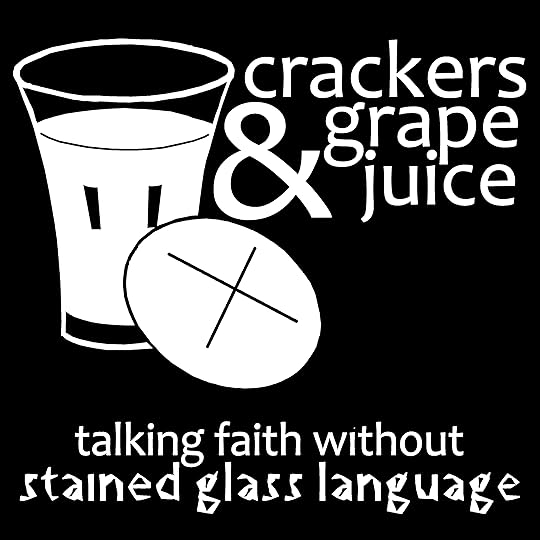 In this episode I talk with Ken Jones, the pastor of Glendale Missionary Baptist Church in Miami, Florida and the co-host with Michael Horton and Rod Rosenbladt of the radio show and podcast
The White Horse Inn.
In this episode I talk with Ken Jones, the pastor of Glendale Missionary Baptist Church in Miami, Florida and the co-host with Michael Horton and Rod Rosenbladt of the radio show and podcast
The White Horse Inn.
Ken was formerly the pastor of the large racially diverse Greater Union Baptist Church in Compton, California, a fact which leads to one of the conversation topics we cover; namely, how diversity, according to St. Paul, is the fruit of clear and urgent Gospel proclamation but it is not to be confused, as happens often in the mainline churches, with the Gospel itself.
In the conversation, we also discuss the Scofield Bible, grace over race, serving a church in Compton, peculiar speech, Christian posture towards the U.S. government, and unhealthy alliances.
As always –
Help us reach more people:
Give us 4 Stars and a good review there in the iTunes store.
It’ll make it more likely more strangers and pilgrims will happen upon our meager podcast. ‘Like’ our Facebook Page too. You can find it here.
Help support the show! This ain’t free or easy but it’s cheap to pitch in.
Click here to become a patron of the podcasts
If you’re getting this by email and the show doesn’t pop up, you can listen at www.crackersandgrapejuice.com
Ken is an e-friend, fellow Dylan lover, and a great encourager of the podcast so I hope you enjoy this conversation.
Follow @cmsvoteup

July 5, 2018
(Her)Men*You*Tics: Omni
 “Omni” is a prefix we attached to God without thinking: omnipresent, Omni-powerful. But what does “omni” really mean?
“Omni” is a prefix we attached to God without thinking: omnipresent, Omni-powerful. But what does “omni” really mean?
And, if God is all things is Dr. Johanna correct in her 3rd grade question, “is God in my poop?” Heavy, heady matters. Music used in the middle of the episode – “God is Not a White Man” by Gungor
As always –
Help us reach more people:
Give us 4 Stars and a good review there in the iTunes store.
It’ll make it more likely more strangers and pilgrims will happen upon our meager podcast. ‘Like’ our Facebook Page too. You can find it here.
Help support the show! This ain’t free or easy but it’s cheap to pitch in.
Click here to become a patron of the podcasts
If you’re getting this by email and the show doesn’t pop up, you can listen at www.crackersandgrapejuice.com
Follow @cmsvoteup

July 1, 2018
God’s First Word

I think introductory sermons at new churches are about as fraught as sophomore album efforts by bands. There’s no good way to do it and there’s way too many balls in the air to thread into a single sermon. Anyways, I kicked off a series on Ephesians at my new congregation today.
The text is Ephesians 1.3-14. I was happy to get to use slides as part of the sermon, something I’ve not been able to do in a while. Here it is:
I’ve done a lot of guest preaching this past year- all over the country- and I discovered that I hate guest preaching.
The listeners don’t know me, don’t know whether I’m serious or sarcastic, and I don’t know them, neither the doubts that shame them nor the sins that keep them up at night.
“With guest preaching, it’s a miracle they hear anything at all,” I griped several times this year to friends.
And then last night, I expressed a little anxiety to Ali about starting here at Annandale and Ali kissed me on the cheek and said “Don’t worry, honey, just think of it as one of your guest preaching gigs.”
I guess that’s how its going to be for both of us, you and me, for a while.
I served at my last church for 13 years. I haven’t transitioned to a new church since 2005- it was a completely different world.
Back then, in 2005, an animated movie called the Incredibles was killing at the box office.
America was up in arms over illegal immigration and a vacancy on the Supreme Court; meanwhile, the White House was engulfed in scandal surrounding a President who had lost the popular vote.
On the religious front, the United Methodist Church was embroiled in controversy over issues of sexuality.
It was a completely different world back then the last time I transitioned to a new congregation.
So a few weeks ago, I asked Clarence for advice on how to survive you all and, after he stopped laughing- belly laughing, giggling really, for like 20 minutes- we took this picture together with your other two previous pastors.
They were laughing at me too, like the bishop had stuck a kick-me sign on my rear end.
Pastor Jack Martin showed us the picture and Clarence whispered to me: “I don’t which of you or me sticks out more.”
“That’s where I got you, Clarence,” I replied, “not only am I young, I’ve got the soul of a black man.”
And Clarence shot me a dubious look like I was crazy so then, to make my case, I showed him my dance moves.
“Check mate,” he conceded.
Looking at that picture of me dancing the white man overbite with a man of my own gender, I know what you’re thinking.
“I didn’t vote for you.”
I didn’t choose you.
And just as an aside, if you’re sitting there saying to yourself that you’re not young enough to get my pop culture references, realize that Monty Python and the Holy Grail came out 2 years before my mother gave birth to me, wrapped me in bands of cloth, and laid me in a manger.
Anyways, I don’t blame you- I bet you’re looking at me this morning and like those Monty Python peasants to King Arthur you’re thinking I didn’t choose you.
Even though the United Methodist system of compulsory speed-dating between pastor and parish makes farcical aquatic ceremonies seem prudent, we’re thrilled to be here and we’re touched by your warm welcome.
My boys are thrilled to be in a church where one of the pastors, Peter, is the same age as them.
And I, for one, am excited to be in a church where one of the other pastors manages to make me look less controversial. As far as I’m concerned, Chenda is like respite care.
But still, if I were you, I’d be thinking I didn’t choose you.
And not having chosen me, my guess is, you want to know more about me.
You want to know about my wife, Ali the attorney, and her undying affection for me.
You want to know how, as my soul mate, she takes everything I say with seriousness and sincerity.
You probably want to know how long we’ve been together and if we’ve always dressed as sharp as we do today (not so much).
You didn’t choose me.
So you probably want to know about me.
And since you’re not just getting me, you’re getting new youth for Trish’s program, you’re probably wondering if my kids have a positive attitude and a teachable spirit.
If you’ve trolled me on social media, you might be wondering into what Hogwarts House the Sorting Hat would put me. Slytherin.
This far into the sermon you’re probably wondering if I’ve always been this cynical and world weary.
As your pastor now, forced to take punches and deal with congregational conflict (not that you have any of that), you may want to know that I’ve not got a fragile ego.
As your priest, you should want to know how close I am with JC.
If you’ve read my book, then you’re likely wondering how much time I have before I get in trouble with the bishop. Fair question.
And if you’ve read my book, then you might also wonder how much time I have.
Fair question.
In an Amazon Prime world where you can choose anything you want and have it droned to your house in hours (though I like to think I’m a package) you didn’t choose me.
So naturally you want to know about me.
But also, you want to know what I’m going to do.
You want to know what we’re going to do, how we’re going to serve our neighbors and how we’re going to grow, how we’re going to reach new people with the promise of the Gospel.
The bad news though-
Our scripture text today doesn’t afford me much permission to talk about myself or, even, to talk about what we are going to do together for God.
Today’s passage is instead entirely (and impolitely so) about God’s choosing and doing.
———————-
Paul didn’t plant the church at Ephesus. Priscilla and Aquila, disciples of John the Baptist did.
So when this preacher named Paul shows up in the Book of Acts having been sent to them, they were strangers to each other.
They didn’t choose him.
And so to begin his ministry with these strangers, Paul does a funny thing at the outset of his epistle.
He doesn’t avoid the awkward subject of choosing; he doubles down on it and reframes it.
He talks about God’s choosing and doing.
And he does so by here in the introduction of his letter by trading out the formal, traditional thanksgiving you could expect at the top of every ancient epistle, the thanksgiving where the author commends his audience for all of their good and faithful doings, and instead he inserts a traditional Hebrew blessing.
To God.
A berakah– a blessing that the Christians who had been Jews would’ve prayed 3 times a day.
Except-
Paul changes the berakah too.
He changes it from a blessing to the Creator for creation, for the sun and the moon and the stars, a blessing for what can be known to anyone and everyone on their own.
He changes the berakah to a blessing of what can only be made known, that which requires revelation from beyond us to know: the Gospel.
He has blessed us, Paul says, not with the sun and the moon and the stars.
He has blessed us by choosing us in Jesus Christ.
And note the past perfect tense there- he has blessed us.
His choosing us in Jesus Christ-it’s complete.
There’s no not yet about his choosing us.
He has blessed us in Jesus Christ with everything that matters.
He has made us holy and blameless, Paul says.
Blameless, by bringing us out of bondage to the Pharaoh called Sin by the purchase price of his blood. That’s what the word redemption means.
And he has made us holy, by giving to us, reckoning to us as our own, Christ’s own righteousness. Christ’s own perfect score under the Law of God is credited to us as our own permanent, perfect score.
He has made us holy and blameless, Paul says, and he has made us his children.
Children by adoption.
Adoption, that which is done entirely by the decree of a Judge.
All of this, all of this ‘lavish’ blessing, Paul says is our inheritance.
And notice-
He doesn’t say all of this is your wage, something you must earn by your doing.
He says it’s your inheritance, something gifted to you unconditionally and irrevocably, by way of another’s death.
Just so you understand that there’s no work you must to do to merit this blessing- and just so you don’t misunderstand and think there’s some way you can backslide your way out of it- the Apostle Paul unspools this blessing all the way back to before the foundation of the world.
Think about that-
Before God said ‘Let there be light,’ Paul says, God’s first words were ‘Let there be Gospel.’
Before God said ‘Let there be sun and moon and stars, God said ‘Let there be this unthwartable promise of the light of Jesus Christ despite our dark hearts and dark doings.’
God’s grace is older than the galaxy’s DNA.
St. Paul uses the word ‘predestined’ there to talk about God choosing us in Christ, but he doesn’t mean that every moment of your life has been predetermined from the get-go.
He means that even before any of us showed up on the scene God had preveniently determined to count you as his forgiven and redeemed child by his own Son’s bleeding and dying, sealed for you by the Holy Spirit in your baptism.
You see-
The reason St. Paul can preach that nothing- no sin you’ve done, no grudge stuck in your craw, no doubt hidden underneath your mattress- in all of creation can separate you from the love of God in Christ Jesus is because God’s love for you in Christ Jesus antedates- precedes- even creation itself.
The Father’s grace to you in the Son was true before was was.
And even now, Paul says, the mystery, older than creation, revealed by Jesus Christ, whom Paul calls the firstborn of creation, is that God is still at work in the world.
Doing.
To make good on his choosing.
What’s unveiled in Christ is that God is at work in the world- mysteriously so- extending this undeserved, one-way love called grace in order to change us, one-by-one, from the inside out.
And just so you don’t miss this point about choosing and doing, this point that God is the active agent, the Doer behind all the doings, Paul unwinds our passage today as one long, run-on sentence in the Greek.
It’s 204 words.
It’s the longest sentence in the New Testament.
And God is the subject of all of its verbs.
We are but hidden away here as the objects of God’s every verb.
———————-
A few weeks ago I was driving to Richmond to visit my mom, and, because I was on Interstate 95, I figured I had about 14 hours to kill so I listened to an episode of the NPR podcast Invisibilia.
The episode told the true story of 2 cops named Allan and Thorleif, in the city of Aarhus in Denmark. Back in 2012 the officers Allan and Thorleif received a phone call from distraught parents- distraught Muslim parents- that their teenage son had gone missing.
As Allan and Thorleif began investigating, other calls from other parents began to cascade into the police station until eventually over 30 teenage sons of 30 sets of parents were missing.
When Allan and Thorleif scratched the surface, asking questions and interviewing people in the community, they began to hear rumors.
About Syria.
About how these teenage boys had been radicalized without their parents realizing.
About how they’d fled to join ISIS and take up jihad.
For whatever reason, these two ordinary, unimpressive cops, who don’t even have sexy cop jobs- they work in neighborhood crime prevention, they took it upon themselves to determine what they were going to do about these missing boys whenever they returned to Aarhus.
For all the cops knew, when these boys came back their town would be receiving dozens of angry terrorists.
And again, this was 2012 when other countries were pulling no punches when it came to potential threats, pulling out all the stops to detain and prosecute anyone suspected of affiliation with ISIS.
And in 2012, the city of Aarhus was second on the list of European countries with a homegrown terrorist problem.
But what Allan and Thorleif chose to do-
They chose beforehand–
Before any of these teens even returned back from Syria
Before a one of them ever fessed up, expressed remorse, or repented
Before Allan and Thorleif found out what they’d done and what they deserved
They chose beforehand, before any of them showed up on the scene, they predetermined to show them love, one-way, undeserved love.
Before a one of these would-be jihadists appeared back in Aarhus, these two ordinary cops chose to impute to them a goodness wasn’t even there.
They chose beforehand to call these teens what they were not- not terrorists; they chose to call them ‘Syrian Volunteers.’
They chose beforehand to treat them, no matter what they may have done or likely did do, as though they’d been volunteering in hospitals and orphanages.
They chose to credit to them a righteousness that was not theirs, and they chose not require them to do anything to earn it.
And so as these missing jihadi teens trickled back home, Allan and Thorleif didn’t meet them at the airport and arrest them.
They welcomed them home.
Later, they’d invite them over to chat.
They connected them with mentors.
They got them back in school and back into jobs.
Of the 34 Aarhus teens who first went missing in 2012, 6 were killed in Syria and 10 went missing. The remaining 18 who returned home were all de-radicalized by those 2 ordinary men.
They’ve done the same for over 300 teens since then.
“We didn’t wait for them to find their way back into the light; we chose not to let them leave themselves in the dark,” Allan says.
“We decided to fight radicalism with love…” Thorleif told the Invisibilia host, and then he paused and you can imagine him smiling before he added…”love paid for by the State.”
When the Invisibilia host asked the cops how they came up with this idea, Thorleif just shrugged and said: “I dunno. At first my partner thought I was crazy.”
And then he said- pay attention now people. There’s an unseen agency at work here, which NPR does not name because TO NAME IT IS THE CHURCH’S JOB.
“It just came to me,” Thorleif confessed.
“The idea just came upon me…a miracle I guess.”
————————
For now at least, I’m just your guest preacher.
You don’t yet know how to listen to me.
So let me make plain what I am saying and what I am NOT saying.
I’m not exhorting you that you must go and do like Allan and Thorleif.
I’m not saying that you ought to go and show risky, undeserved, one-way love to every enemy in the world and each antagonist in your life.
Such an exhortation would be what Martin Luther called preaching the Law (not the Gospel) and, because it’s a burden you couldn’t possibly fulfill, it would only frustrate you until you began to hear the exhortation as an accusation.
Go and do like Thorleif.
Maybe not today but, eventually, you would not experience that as good news.
And it would not be the Good News.
It would not be the Gospel because, notice, it makes us the subject of the sentence, but the Gospel is that we are the objects of God’s verbs.
God’s past, future, and present verbs.
Let’s be honest about ourselves, shall we?
The good news in the good news is that we are not the good news.
We are the objects of it.
Were it otherwise, you’d have every reason to be anxious about a new pastor and every reason to be torqued off that you didn’t get to choose any of the three of us.
Of course, were it otherwise-
If it was all on us
If we were the subjects of all the church’s verbs, then you wouldn’t need to worry about a pastor at all.
Because there’d be no need for the Church at all.
But as it is-
What makes the Church different from a political party or a kiwanis or country club, distinct from a social justice agency or a corporate organization- what makes us unique from any other religion even- is the Gospel.
And the Gospel is not about what we choose to do in the world.
The Gospel is what God has chosen to do. From before time.
For us by his cross.
And through us by his Holy Spirit.
————————-
On the night we betray him, Jesus tells us at the table: “You did not choose me; I chose you.”
In fact, unlike in the Old, in the New Testament there is next to nothing about our choosing to serve the Lord (or choosing to do much of anything else for that matter).
Instead the New Testament emphasizes that God has chosen you and chosen to do through you, and, I’ve been a pastor long enough to know, most of the time, that looks for us as mysterious and surprising as it did for Allan and Torleif.
It looks like what we do at this table.
We do not bring anything to this table but our sin and an open hand willing to trust whatever God chooses to put in it.
The sacraments are not simply signs to us they are signs of us.
Signs that, in a world addicted to having our own agency, like water and wine and bread we are ordinary, unwitting creatures of his choosing and doing.
Such that, if we do Christ’s work at all it’s a miracle.
I wonder-
What will God do with us?
Follow @cmsvoteup

June 29, 2018
Episode #158 – What is It Like to Work with the Tamed Cynic?
 Taylor and Teer got together to record an episode shortly before our last live event and on the eve of my transition after 13 years to a new congregation they shared wisdom from their own recent transitions. Having both come up in my congregation and worked alongside me, they offer a few nuggets for my new congregation at Annandale from the vantage point of both parishioner and fellow pastor.
Taylor and Teer got together to record an episode shortly before our last live event and on the eve of my transition after 13 years to a new congregation they shared wisdom from their own recent transitions. Having both come up in my congregation and worked alongside me, they offer a few nuggets for my new congregation at Annandale from the vantage point of both parishioner and fellow pastor.
In truth, I haven’t yet listened to this episode so if they say anything unflattering about me you should know right know that they’re liars.
Stay tuned for future episodes. We’ve Ken Jones talking about diversity as the fruit of the Gospel not the Gospel itself, our live conversation with Johanna and Kendall Soulen, Mark Galli of Christianity Today, Charlotte Getz and Stephanie Phillips about their joint comedic memoir Unmapped, and anabaptist friend John Nugent, author of Endangered Gospel, is returning to calm the crazy and reflect on how we can be the Church in an outrage culture.
As always –
Help us reach more people:
Give us 4 Stars and a good review there in the iTunes store.
It’ll make it more likely more strangers and pilgrims will happen upon our meager podcast. ‘Like’ our Facebook Page too. You can find it here.
Help support the show! This ain’t free or easy but it’s cheap to pitch in.
Click here to become a patron of the podcasts
If you’re getting this by email and the show doesn’t pop up, you can listen at www.crackersandgrapejuice.com
Follow @cmsvoteup

June 28, 2018
First into the (Refining) Fire: Being Prophetic vs. Bearing Judgement
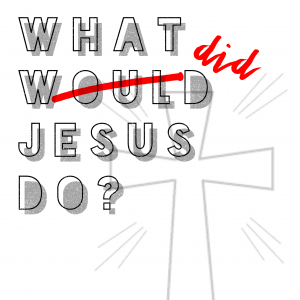 As Sarah Condon noted in a recent post at Mockingbird, pastors of late seem consumed with the question “Will my sermon be newsy enough this week?” Often, this concern is couched in the mandate for preachers to be prophetic. Thou Shalt Preach This Issue, Sarah rightly observed, is a law pastors have been laying on each other with increasing fervor since the election of Donald Trump to the White House, adding from our pulpits to the chorus of shoulds and ought available 24/7 on our social media newsfeeds and cable channels.
As Sarah Condon noted in a recent post at Mockingbird, pastors of late seem consumed with the question “Will my sermon be newsy enough this week?” Often, this concern is couched in the mandate for preachers to be prophetic. Thou Shalt Preach This Issue, Sarah rightly observed, is a law pastors have been laying on each other with increasing fervor since the election of Donald Trump to the White House, adding from our pulpits to the chorus of shoulds and ought available 24/7 on our social media newsfeeds and cable channels.
Make no mistake, there is a place for the prophetic in the Church’s worship life. Though, too many preachers seem to have forgotten that the prophetic in the Old Testament is a mantle thrust upon unhappy vessels against their own volition. It is not one happily taken up as a calling. Likewise, I fear that preachers on the left have made the same error as preachers on the right in confusing the Church with America, for the prophetic posture is most often directed today at the ‘Powers’ (the federal government) whereas the Hebrew prophets directed their godly ire at God’s own people and did so, more often than not, for the sin of idolatry of which injustice etc. were but symptoms. It’s true that the Hebrew prophets also prophesied against their leaders, but, again, Israel was a theocracy, made explicitly so by God.
I, for one, am uncomfortable with any use of the prophetic that relies upon the same construal of America as Israel as employed by that charlatan pastor in Texas whose choir sings ‘Make America Great Again’ in Sunday worship.
What seems to be missing, however, in the urgency to prophesy God’s judgement against galling abuses at the border and other issues is the humility that as Christians, we’re supposed to put ourselves first under God’s judgment.
As much as we’re called to be prophetic- indeed perhaps more so- Christians are called to place ourselves first before the rest of the world under God’s judgment.
Because we’re the only ones who know not to fear the Judge.
Christians like to say that every Sunday is a little Easter, but, every day—every day is Ash Wednesday, where we bear the judgment of God on behalf of a sinful world.
The Apostle Peter makes this point when he writes in his letter that “Judgment begins with the household of God.”
The household to which Paul writes in Rome was divided against itself over issues of food and worship. It reads in Romans like an obscure, arcane issue, but wipe the dust off their dispute and you discover it’s really the same debate you see spun out all over social media, on CNN and Fox News, and across the front page of your newspaper (if you still trust them enough to read them).
It was a debate over politics and identity. It was an issue of “Us” vs. “Them.”
The community in Paul’s Rome had split into factions, drawn lines, created competing tribes whose divisions had calloused and calcified into contempt.
Sweep the dust off this argument and you see that the community in Paul’s Rome was no different than the community in the Rome we call America.
Carnivores vs. Vegetarians. It’s different in form but not in function from Democrats vs. Republicans.
Meat-Eaters vs. Non-Meat-Eaters—it’s the same dynamic as Black vs. White, Conservative vs. Progressive, Racist vs. Righteous. Every time, in each instance—it’s like Pink Floyd said; it’s Us and Them.
And to them all, the Apostle Paul admonishes: “Do not judge…for we will all stand before the Judgment Seat of God.”
“Judgment begins with the household of God.”
Paul isn’t arguing that there are “many sides” to every issue.
Paul isn’t asserting that every possible practice or perspective is permissible.
Paul most certainly isn’t urging acceptance for acceptance’s sake or tolerance for tolerance’s sake.No, when Paul implores the Christians in Rome not to cast judgment, he’s instead instructing them to bear it.
To bear judgement.
Upon themselves.
When Paul reminds them that we will all stand before the judgement seat of God, he’s not warning them of coming condemnation. There is no condemnation for those who are in Christ Jesus.
Paul isn’t preaching fire and brimstone. Paul’s pointing to their baptisms. He’s reminding them of their calling, their commissioning. He’s exhorting them to imitate Christ.
We talk all the time about imitating Christ, about being his hands and feet, and doing the things Jesus did. Most of the time we’re talking about serving the poor, forgiving another, or speaking truth to power.
But if the most decisive thing Jesus did was become a curse for us, taking on the burden of judgment for the guilty, then the primary way Christians imitate Christ is by bearing judgment on behalf of the guilty.
The primary way Christians imitate God-for-us is by bearing judgment for others.
Don’t you see—that’s how this is good news. It’s us. We’re the good news.
We’re the good news of God’s judgment. We’re the followers of Jesus Christ who, like Jesus Christ, mimic his willingness to bear the judgment of God on behalf of the guilty. We’re the good news in this word of God’s judgment.
In a world sin-sick with judging and judging and judging, indicting and scapegoating and recriminating and casting blame—we’re the good news God has made in the world.
Just as Jesus said, the first will be last and the last will be first.
We who are baptized and believing, we who are saved and sanctified- we who should be last under God’s judgement thrust ourselves to the front of the line and, like Jesus Christ, say “Me first.”
Rather than judging, we put ourselves before the Judgment Seat. Rather than condemning and critiquing, we confess. We bear judgment rather than cast it.
We listen to the guilty. We never stand self-righteously at a distance from them. We never forget that “there but for the grace of God” we’d be just like them, and that it is them, not us, them—the ungodly—for whom God died.
We bear judgement rather than cast it.
We confess: our own sinfulness and guilt, our own racism and violence and pettiness, our own apathy and infidelity and failures to follow.
Knowing that there have been plenty of times we’ve seen Jesus thirsty and not given him a drink, plenty of times we’ve seen Jesus an immigrant and not welcomed him.
Knowing that even when we have seen Jesus hungry and fed him that doesn’t change the fact that even our good deeds, our best deeds, are like rags, for not one of us, really, is righteous and there is no distinction, really, between any of us.
We bear judgment rather than cast it. Because we know we can come before God’s Judgment Seat expecting to hear the first words spoken when God came to us: “Do not be afraid.”
We’re the good news in this word of God’s judgment.
In other words, I would argue that as much as the Church might need prophetic voices in its midst it also needs voices willing to confess their own sins of racism and nativism. Bearing judgement upon ourselves, we’re more likely to see grace as available to the ungodly among us.
Follow @cmsvoteup

June 27, 2018
(Her)Men*You*Tics: Nomos
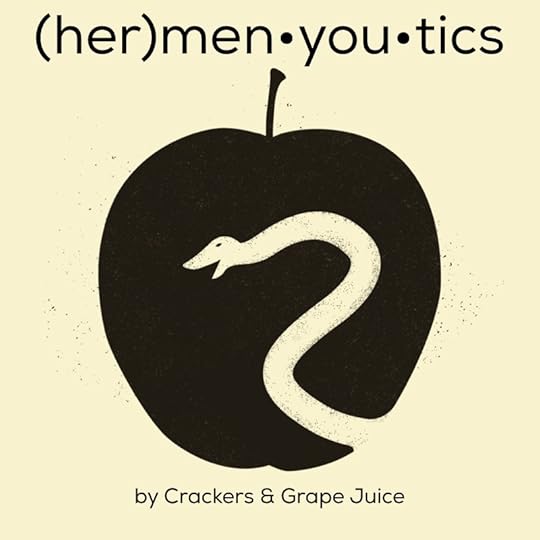 ‘Nomos’ is the Greek word for ‘Law,’ one of the two words, according to Luther reading St. Paul, by which God has spoken to us and still speaks to us. In this episode, we talk about the Law, it’s uses, and its fundamental purpose to drive us to the Gospel of mercy and grace.
‘Nomos’ is the Greek word for ‘Law,’ one of the two words, according to Luther reading St. Paul, by which God has spoken to us and still speaks to us. In this episode, we talk about the Law, it’s uses, and its fundamental purpose to drive us to the Gospel of mercy and grace.
Along the way, we talk about Romans 13, proof-texting, Jeff Sessions, and MSNBC. Is the take away ‘its okay to suck’ or is it, as Dr. Johanna insists, that we should have some shame?
As always –
Help us reach more people:
Give us 4 Stars and a good review there in the iTunes store.
It’ll make it more likely more strangers and pilgrims will happen upon our meager podcast. ‘Like’ our Facebook Page too. You can find it here.
Help support the show! This ain’t free or easy but it’s cheap to pitch in.
Click here to become a patron of the podcasts
If you’re getting this by email and the show doesn’t pop up, you can listen at www.crackersandgrapejuice.com
Follow @cmsvoteup

June 22, 2018
Episode #157 – Erin McKenney: The Bible is a Story of Immigration
 For Episode #157, we talked with Erin McKenney who is the Executive Director of Just Neighbors, a legal aid and advocacy organization for immigrants in the DC-Northern Virginia Region. We talked to Erin amidst the furor over the administration’s policy of separating children from their parents at the border. Erin helps us think about the issue of immigration from a broader systemic perspective as well as biblically in a way that, I think, moves beyond headline hyperbole and avoids perpetuating the cultural antagonisms of Red vs. Blue.
For Episode #157, we talked with Erin McKenney who is the Executive Director of Just Neighbors, a legal aid and advocacy organization for immigrants in the DC-Northern Virginia Region. We talked to Erin amidst the furor over the administration’s policy of separating children from their parents at the border. Erin helps us think about the issue of immigration from a broader systemic perspective as well as biblically in a way that, I think, moves beyond headline hyperbole and avoids perpetuating the cultural antagonisms of Red vs. Blue.
You can find out more about Just Neighbors, donate, or sign up to help by clicking the link here
The whole podcast posse was together in Hampton, Virginia for a live podcast event with theologian Kendall Soulen. Over 170 people came out. We’re incredibly grateful for the support, thoughtful feedback, and encouragement. We ran out of our 50 free pint glasses an hour before starting!
Help us reach more people:
Give us 4 Stars and a good review there in the iTunes store.
It’ll make it more likely more strangers and pilgrims will happen upon our meager podcast. ‘Like’ our Facebook Page too. You can find it here.
Help support the show! This ain’t free or easy but it’s cheap to pitch in.
Click here to become a patron of the podcasts
If you’re getting this by email and the show doesn’t pop up, you can listen at www.crackersandgrapejuice.com
Follow @cmsvoteup

Jason Micheli's Blog
- Jason Micheli's profile
- 13 followers





